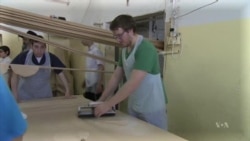WASHINGTON —
Jewish people around the world are celebrating Passover, a commemoration of their liberation from slavery in Egypt more than 3,300 years ago. According to scripture, God helped the Jews, led by Moses, escape bondage in Egypt and cross the Red Sea into the desert. The story of the Jewish Exodus resonates with other people trying to escape slave-like conditions.
Preparations for Passover include butchering sheep and baking unleavened bread known as matzah.
"It's called the food of faith, just like our forefathers, when they left Egypt into the desert with a lot of faith, and trust in God, they went with these matzahs and we relive it every year when we celebrate the holiday of Passover, and we sit at our Passover table eating the matzah," said Rabbi Menachem Glukovsky.
Tradition does not allow consumption of products with yeast during the seven-day festival. Many Jewish communities observe the symbolic burning of yeast ahead of Passover.
"The symbolic burning of the chametz (leaven)… is a symbol of all the sins of klal yisrael, the Jewish people… we pray to Hakodesh Baruch Hu (the Holy One Blessed by He) that all our sins should be burnt and we go in to the Pesach Yom-Tov (Passover holiday) fully purified," said Yehoshua Klein, an ultra-Orthodox Jew in Jerusalem.
In the neighboring West Bank, a Samaritan community near the city of Nablus performed a traditional butchering of sheep.
"This holiday is for seven days, first day is the slaughter day. We eat during this holiday only stuff without yeast, for example we make the bread at home without yeast," explained Haroun Saloum, a Samaritan priest.
It is not only Jews who observe Passover. Hundreds of detained African migrants gathered in Israel's Negev desert on Friday to eat matzah and recall the Passover story, outside the facility where they are being held. Despite efforts to prevent immigration from Egypt, and repatriate illegal African migrants, hundreds cross into Israel every year.
"You [Jews] asked to leave Egypt. We also asked to leave our countries because the situation there is very difficult. The Torah says don't wrong a stranger, don't do those things, because you were also one in Egypt. So I tell them [the Jews] don't forget the Torah," said Anwar Suliman, one of the Africans held in Israel's Holot detention facility.
Rabbi Susan Silverman, a pro-migrant activist, said Jews celebrating Passover must recall the real spirit of Passover.
"Every single person in this country who sits down to a Passover seder [meal] has to say to themselves: am I taking care of the stranger among us right now? Why am I doing this ritual? Is it an empty, meaningless ritual and I do it because my parents did it and my grandparents did it and my great-grandparents did it? Or do you do it because it means something?" said Silverman.
Passover dinner is usually celebrated at home with family members and close friends. But in Nepal's capital, Kathmandu, hundreds of Jewish travellers joined by local residents attended what organizers claim was the world's biggest Passover celebration on Monday.
Preparations for Passover include butchering sheep and baking unleavened bread known as matzah.
"It's called the food of faith, just like our forefathers, when they left Egypt into the desert with a lot of faith, and trust in God, they went with these matzahs and we relive it every year when we celebrate the holiday of Passover, and we sit at our Passover table eating the matzah," said Rabbi Menachem Glukovsky.
Tradition does not allow consumption of products with yeast during the seven-day festival. Many Jewish communities observe the symbolic burning of yeast ahead of Passover.
"The symbolic burning of the chametz (leaven)… is a symbol of all the sins of klal yisrael, the Jewish people… we pray to Hakodesh Baruch Hu (the Holy One Blessed by He) that all our sins should be burnt and we go in to the Pesach Yom-Tov (Passover holiday) fully purified," said Yehoshua Klein, an ultra-Orthodox Jew in Jerusalem.
In the neighboring West Bank, a Samaritan community near the city of Nablus performed a traditional butchering of sheep.
"This holiday is for seven days, first day is the slaughter day. We eat during this holiday only stuff without yeast, for example we make the bread at home without yeast," explained Haroun Saloum, a Samaritan priest.
It is not only Jews who observe Passover. Hundreds of detained African migrants gathered in Israel's Negev desert on Friday to eat matzah and recall the Passover story, outside the facility where they are being held. Despite efforts to prevent immigration from Egypt, and repatriate illegal African migrants, hundreds cross into Israel every year.
"You [Jews] asked to leave Egypt. We also asked to leave our countries because the situation there is very difficult. The Torah says don't wrong a stranger, don't do those things, because you were also one in Egypt. So I tell them [the Jews] don't forget the Torah," said Anwar Suliman, one of the Africans held in Israel's Holot detention facility.
Rabbi Susan Silverman, a pro-migrant activist, said Jews celebrating Passover must recall the real spirit of Passover.
"Every single person in this country who sits down to a Passover seder [meal] has to say to themselves: am I taking care of the stranger among us right now? Why am I doing this ritual? Is it an empty, meaningless ritual and I do it because my parents did it and my grandparents did it and my great-grandparents did it? Or do you do it because it means something?" said Silverman.
Passover dinner is usually celebrated at home with family members and close friends. But in Nepal's capital, Kathmandu, hundreds of Jewish travellers joined by local residents attended what organizers claim was the world's biggest Passover celebration on Monday.






